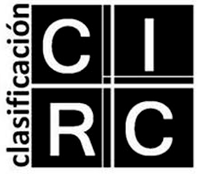Focus and scope
The RiHC. Revista internacional de Historia de la Comunicación, edited by the Asociación de Historiadores de la Comunicación (AsHisCom) and released through the Editorial de la Universidad de Sevilla, is aimed at the digital publishing of research on the historical evolution of communication in all its forms and fields, including the study of the modes of production, circulation, and appropriation produced in a given historical context.
Thus, the classic conception of the discipline that is limited to the study of the media is transcended, expanding the object of study to the mediation processes produced by sociocultural agents (printers / editors / cartoonists / reporters and readers and listeners) in specific sociohistorical coordinates.
Consequently, this magazine conceives communication as a symbolic exchange -mediation process- based on the joint analysis of the materiality that the communicative forms and the social practices -use, handling, etc.- that they generate. Similarly, there is also room for analysis of the discourse and social history of producers and recipients.
Communicative manifestations such as literary (if they are not mediated by journalistic, radio, or television media) or cinematographic (if they are not related to journalistic, radio, or television media) are left out because there are other s pecialized magazines that deal with these fields. Likewise, the works on History of the present time that are received will be evaluated in the first instance by the Editorial Board to decide their admission to the evaluation process.
The journal has two annual semestral issues, and is non-profit making. The Editorial Board is formed by AsHisCom members, while the Scientific Advisory Committee includes leading specialists in the History of Communication, particularly in Europe and Latin America, the regions from which the majority of contributions to the journal are proposed. The first issue was published in the second semester of 2013.
The journal is open to all author profiles, whether academic teachers, researchers, or students, as a doctorate is not required for publication. Similarly, the content of all RiHC issues and publications is open to the general public.
The thematic scope of the journal is global, worldwide, although most of the contributions focus on European and Latin American areas. RiHC accepts articles written in Portuguese, English, Spanish, and other languages of the Spanish state, thus enabling access to and from the Latin American world as a whole, the importance of which is notable in the study of the History of Communication.
The journal is free of charge and does not apply any publication fees. The articles are published after a rigorous evaluation process carried out by anonymous peer reviewers. The aim of RiHC and the role of its Editorial Board is to oversee the quality of the journal’s content, then the strict procedures prior to publication.
In addition, the journal maintains a conscientious ethical code and has adhered to international standards of good practice in scientific publication with the aim of preventing misuse of research.
The most frequent thematic lines of the journal include:
-History of the press and communication.
-History of the graphic press, editorial cartoons, or comic strips.
-History of advertising and the press.
-History of radio and television.
-History of the local press.
-Coverage of events and protojournalism.
Biographies. Journalists and communication entrepreneurs.
-Media and power. Media systems, property, and shareholders.
-History of corporate communication.
-Press and emigration.
-Press and identities.
-Press and fashion.
-Press and gender. History of women in journalism.
-Discourse analysis and historical media coverage.
-History of journalistic genres and audiovisual formats.
-History of digital media.
- History and culture of the media.
- History of communication and photography as a sociocultural artifact.
- Social history of press readings
- Social history of the promoters of the press and journalism.
However, the editorial board of RiHC will consider all submissions that reach the journal with content that may broaden the perspectives and themes within the History of Communication.












